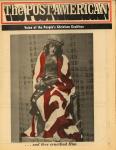"The shovel and the Uzi machine gun are my Messiah," said an Israeli kibbutz worker to me in a cotton field one day. I could not identify with the machine gun, but I have been thinking about the shovel much lately. Have I been expecting the kingdom of God to come while I play educational and social games in the university world? Have I been involved in a shovel-less Christianity? Has the body of Christ lost its muscle? We do not even sweat healthy drops of sweat, to say nothing of drops of blood. Living in a bomb shelter under a machine gun factory with seven others, getting up at 4:00 a.m. to pick pears with students from several countries, showering in cold water, working for simple meals, housing, and the welfare of 300 other people (not for money), and loving it all, shattered my American fetishes so that the culture shock was much greater when I landed in America then when I landed in Tel-Aviv.
Buicks roll overweight businessmen one by one to dehumanizing jobs? I had just seen 25 healthy people singing as they rode in the kibbutz truck to pick pears together. Uncomfortably and overly clothed people roam New York streets to buy more uncomfortable clothes? I had just spent an entire summer in work shorts, T-shirts, and work shoes. Old people are removed from their families and are herded into antiseptic, cinder block, flower-strewn corrals: I had just seen a group of older people who lived together in the same community as their children and grandchildren, who were given real jobs according to their health. Thousands of alienated people sleep in parks, train stations, streets and jails in the world's most prosperous country; I had just seen a place where anyone who wanted to work six hours a day would never starve and where a meal and lodging for one night could be had for nothing (unless one is an Arab!). Americans glut themselves on plastic-wrapped Pop-Tarts, potato chips, impoverished bread, frozen vegetables, canned starch, and TV dinners; I had just spent an entire summer eating meat, bread, fresh vegetables, fruits, and much yogurt. Children sit alone, bored, watching cartoons after school; I had just seen 50 Israeli children crowding around one television to see the same cartoons (with Hebrew subtitles) and laughing together beautifully. Suburban garbage heaps of wasted affluence pile up just miles from hungry and naked black children; I had just seen equitable distribution of wealth and economic conservation of goods. White Americans retreat to spacious skies and ample waves of grain; I had just helped others plow and water the land and we had only two automobiles and one truck to pollute the spacious skies. Our only gain was tomatoes, pears, apples, cotton, bananas, oranges, avocados, healthy bodies, a thriving community of children, students, and adults, and a life purpose—that's all.
Was it accidental that the most idealistic people in ancient Israel, the school of the prophets, lived socially? That the early church "met constantly to hear the apostles teach and to share the common life …?" That "all whose faith had drawn them together held everything in common?" That they sold their property and possessions and made a general distribution as the need of each required?" That Jesus and his disciples lived and ate together, and even shared a common purse? How is it that those who call themselves his disciples today have so seldom felt the need of such communities? Has the church been distorted by materialistic capitalism and rugged individualism? There are a few exceptions, but generally socialized life has been the penalty of society's pariahs—alcoholics, orphans, the extremely old—and these have been safely separated from the larger Christian community. Does the body of Christ also have a weak heart?
An estimate of housing needs in America prophesied that 28 million new housing units would be needed by the end of the 1970s and the current rate would supply only 5 million. Socialized living is not one option among many; it is mandatory. America's problem is not under-housing but over-housing. Too many living rooms in America are not being lived in. Just today I saw a mother confine her four children into a small recreation room in order to "protect" the furniture in the other 15 rooms of the house. Be creative people! Lovingly creative! An empty room is a venal sin; an unused cottage or second home a mortal one. Mansions are ideal only in heaven—overpopulation is extremely unlikely there.
Communal living is not only important because of the housing shortage. Informed and ethical people are becoming increasingly leery of their participation in the corruption of the dominant American lifestyle. A new generation of Christians is emerging that is an enemy to American war involvement, racism, government deception, and materialistic values, and we want alternatives—not liberal politicians and Great Societies. An ethically self-conscious community that is militant in its refusal to be co-opted by the American ethos and firm in its purpose can create such an alternative. These grassroots, unlike kibbutzim and monasteries, should not be separatist, but bases for penetrating society with the message of total redemption in Jesus Christ: redemption of the individual, a new people who wish to "shine as lights in the midst of a crooked and perverse generation," a new church; redemption of creation by community conservation, a new world. But this demands sacrifice, surrender, and the shovel.
Dennis MacDonald was associate editor of The Post-American, the predecessor to Sojourners, when this article appeared.

